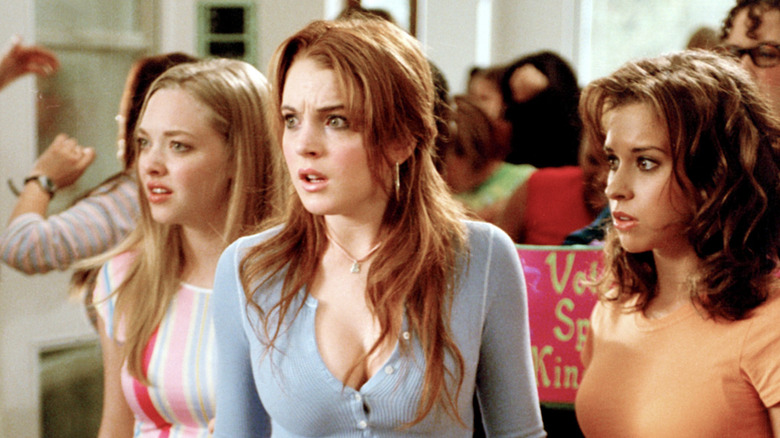How Anchorman Shamed A Sexist MPAA Board Into Giving Mean Girls Its PG-13 Rating
"Mean Girls" and "Anchorman" happen to be two of the defining comedies of the 2000s, and if you don't agree with that pretty basic statement, you can argue with the wall. Both gave us some of the most pervasive and popular quotes in recent cinematic history, from "stop trying to make 'fetch' happen" to "that escalated quickly," and for God's sake, the box office hit "Mean Girls" even has its own defacto holiday, which just so happens to be on October 3 (a funny little reference to a particular day when the movie's leading lady Cady Heron, played by Lindsay Lohan, dares to speak to her crush in math class). Did you know, though, that "Anchorman" helped "Mean Girls" dodge a punishingly high rating from the MPAA?
In a 2014 article on Vulture commemorating the 10-year anniversary of "Mean Girls," director Mark Waters revealed that the MPAA (now just MPA) gave him and screenwriter Tina Fey a hard time over one line where a girl describes a specific reason as to why she needs to use super "jumbo" tampons. (I gotta note here that "Mean Girls" threw in the "jumbo" for free. They're just called "super.")
"The line in the sand that I drew was the joke about the wide-set vagina," Waters recalled of the line. "The ratings board said, 'We can't give you a PG-13 unless you cut that line.' We ended up playing the card that the ratings board was sexist, because 'Anchorman' had just come out, and [Will Ferrell's lead character and the titular anchorman] Ron Burgundy had an erection in one scene, and that was PG-13."
As Waters (correctly!) said to the ratings board, he felt sure that "Mean Girls" faced a penalty that nobody ever really considered for "Anchorman." Waters recalled:
"We told them, 'You're only saying this because it's a girl, and she's talking about a part of her anatomy. There's no sexual context whatsoever, and to say this is restrictive to an audience of girls is demeaning to all women.' And they eventually had to back down."
Waters and Fey had to make other changes, but at least they won this battle.
Mean Girls simply found clever — and frankly bonkers — ways to keep its PG-13 rating
There's another infamous line in "Mean Girls" that changed before the movie could stick with its PG-13 rating, and it has to do with a hot dog. (By the way, just to clarify: an R rating for a teen-centered movie like "Mean Girls" would have seriously interfered with the movie's ability to actually market itself to teens, as it would have technically barred entry to any audience members under 17 in theaters.) As Mark Waters also told Vulture, there's a scene where Lindsay Lohan's new girl Cady Heron hangs out with the popular "Plastics" clique — queen bee Regina George (a vicious and excellent Rachel McAdams) and her acolytes Gretchen Weiners (Lacey Chabert) and Karen Smith (Amanda Seyfried) — and they inspect the Plastics' Burn Book full of mean comments about their classmates. When they get to Amber D'Alessio's (Julia Chantrey) page, the girls chuckle about how she "made out with a hot dog," which doesn't make a ton of sense right off the bat.
As it turns out, Mark Waters and Tina Fey ran into trouble with the original version of that line, too. "We had lots of battles with the ratings board on the movie," Waters recalled. "There was the line, 'Amber D'Alessio gave a blow job to a hot dog,' which eventually became 'Amber D'Alessio made out with a hot dog.' Which is somehow weirder! That's the thing we found: When you're trying to make a joke obey the rules and not use any bad words, it can actually become seamier, even."
This is, of course, an incredibly silly change that "Mean Girls" was forced to make, but Waters is right; it sort of makes the joke funnier, albeit much weirder. It's interesting, then, that using "Anchorman" in an argument helped Waters and Fey talk the MPAA off an R-rated ledge, because the way it deployed its most "obscene" joke is a stroke of absolute genius.
Elsewhere, Anchorman used its one allowed profanity with gusto
You might think you remember "Anchorman" pretty well, but in between all of Will Ferrell's bombastic antics as Ron Burgundy, you may not have noticed that the film uses profanity so sparingly that it sets up one of its most memorable moments seamlessly. Throughout the movie, Ron doesn't curse, preferring "expletives" like "great Odin's raven!" and "by the hammer of Thor!" That's why the moment he says one of the "baddest" words in the English language goes so hard.
Historically, PG-13 movies have been permitted to drop an f-bomb once per movie, and in "Anchorman," it is deployed in the funniest possible way. After tensions rise between Ron and his new female co-anchor, Veronica Corningstone (a snarling, incredibly funny Christina Applegate), Veronica fiddles with the teleprompter, knowing full well that Ron will obediently read anything he sees there. After he tells his beloved city of San Diego "go f*** yourselves" during his nightly sign-off, Ron is immediately fired and his life falls apart; the funniest immediate detail here is that Ron has no idea he said anything untoward until he watches the footage again, but the reason this joke works so well at all is that "Anchorman" pulls its profane punches.
By not letting any characters in the movie curse say any universally accepted "bad words" until Ron's accidental outburst, it gives that line so much more weight, to the point where it even seems wildly shocking the first time you see it. By making the most of its single allowed "f-word," "Anchorman" does something unbelievably brilliant ... and without even trying, its subversive brilliance helped movies like "Mean Girls" avoid restrictive ratings to boot.


